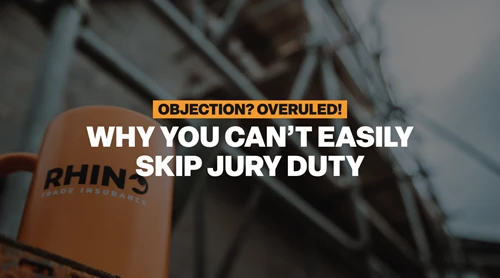Being properly insured as a tradesperson is very important. But so is being able to prove it. This is why tradesman insurance documentation in the form of a certificate of insurance is such a big deal.
Let’s take a closer look at this all-important document.
What is a certificate of insurance?
The certificate of insurance is a document which demonstrates your insurance status and outlines your cover in brief detail. It can be either a physical document, or a digital one.
Your certificate acts as proof of cover, not the actual policy itself. This means that if it’s lost or damaged, it doesn’t mean that the policy is invalid – you’ll just have to get a replacement from your insurer.
Your insurer or broker will send you a certificate of insurance once you’ve taken out your policy. Again, this can be in the post, via email, or both. You should get your certificate fairly quickly after you take out the policy. How long depends on your insurer – with Rhino it just takes a few minutes to arrive in your inbox and be available for viewing in your online account accessible via our website.
Don’t expect every single detail of your policy to be included in the certificate of insurance. You’ll generally just find a few key details (listed below). Full details can be found in your Policy Wording document, which you’ll also be sent once you’ve taken out cover.
Main Components of a Certificate of Insurance Explained
An insurance certificate generally includes the following:
- Your name, and the name of the insurer.
- Policy number and type of policy e.g., public liability insurance.
- Coverage limits – this is the maximum amount your insurer will pay out in the event of a claim.
- Start and finish date of your cover.
- Inclusions and exclusions – only the basics, so always refer to the Policy Wording document for the full list.
Importance of a Certificate of Insurance for Tradesmen
A key function of the certificate of insurance for tradesmen is that it proves to others that you hold the insurance. As a self-employed tradesperson, being able to show you’re fully insured is greatly beneficial as it instils trust in your clients that you’re able to put things right and that hiring you won’t harm your clients financially. Without the certificate of insurance, the hiring party has no assurance that they’re protected against financial losses arising from accidents, injuries, property damage or advice gone wrong.
In some cases, it’s the law to display your insurance certificate. For example, if you employ any staff in your business, UK law dictates that you are covered by Employer’s Liability Insurance and display your certificate where your employees can see it.
Even if it’s not mandated by law, it’s a good idea to display your certificate so that’s it’s easily accessible for viewing by customers, the public and inspectors.
On the other hand, you might want to see the insurance certificate of a subcontractor or third party that you yourself hire. It’s always good practice to either take copies of insurance documents, or get the insured party to obtain a ‘letter of confirmation of cover’ from the insurer before job commencement and store them securely. Also, make sure to check the policy effective dates and indemnity limits to make sure that their policy covers the duration of the project and the full scope of activities that you will require.
Why is it so important to be insured in the trades industry?
As a self-employed tradesperson, you’re exposed to a variety of financial risks which have the potential to harm your business if you don’t have the right protection in place.
That’s where trade insurance comes in, offering:
- Financial protection for you
There are dozens of ways being insured can save your financial bacon when you work in the trades.
For example, sick pay is non-existent for a self-employed tradesperson, so you need some form of Income Protection or Personal Accident Insurance to make sure you can still pay the bills should something happen.
And if a customer or member of the public comes to harm as a result of your business activities, you’ll need to rely on a robust Public Liability Insurance policy to cover the costs associated with compensating the injured party for the damage done.
Similarly, if a client takes issue with your professional advice or guidance and accuses you of professional negligence, you’d better hope you’ve got Professional Indemnity Insurance to settle things.
Tool theft is likely to happen to you at one time or another, which is where Tools in Transit Insurance steps in to cover the cost of their replacement or repair.
There are many other policies which will greatly benefit a self-employed tradesperson, and act as a valuable investment for your business to safeguard its future.
- Enhanced trust with clients and customers
Being able to shout proudly from the rooftops that you’re a fully insured tradesperson does wonders for your reputation within your chosen industry. Having a policy in place to cover every eventuality offers potential customers the reassurance they need to hire you with confidence.
- Fulfilment of legal and contractual requirements
In the UK, you must hold Employer’s Liability Insurance by law if you have any staff. You can get big fines if you fail to display your EL insurance certificate, either as a physical copy in a communal space at your work premises, or as a digital copy in an accessible location to all employees, e.g., on the intranet or shared drive.
Further, holding a certain type of insurance at a certain level is often a stipulation of trade contracts. The employer or main contractor will almost certainly ask to see your certificate of insurance, so make sure you’ve got your document to hand (or easily accessible in digital format) before closing those big jobs. A letter of confirmation of cover from your insurer will be required if you don’t want anyone to make copies of your insurance certificate.
Understanding the Coverages Listed: Focusing on Public Liability
By far the most common insurance document that tradespeople will need to have is the public liability insurance certificate. This policy is the foundation of insurance for anyone who is self-employed and comes into contact with members of the public during the course of their business activities. There are dozens of other policies that can protect self-employed tradespeople, but public liability insurance is the daddy of them all.
- What is public liability insurance?
Public liability insurance will cover the costs should a customer or member of the public experience an accident, injury, illness or damage to their property which was caused by you or your business. As every tradesperson works with the public, this insurance cover is absolutely vital.
Public liability insurance doesn’t cover your employees. Nor does it cover any costs incurred by the customer due to your consultancy, for example any designs, plans or expert advice gone awry. For a full list of exclusions, always check the policy wording document that your insurer will provide. Rhino’s insurance documents are handily available at the bottom of our insurance pages for you to check out in your own time.
Validity and Expiry: Ensuring Continuous Coverage
- Keep track of expiry dates
Your insurance certificate will include the dates that your policy is effective. You should make sure you know when your policy is due to expire so you can make sure your coverage doesn’t have any gaps. If you’re the forgetful type, make sure you opt in for auto-renewal of your policy.
- Reviewing your policies as and when require
When you take out a trade insurance policy, the quote you receive is valid for the state of your business at the time. This means that any changes to your business, including number of employees and activities undertaken, means you’ll need to review your cover. Otherwise, your business might not be adequately covered.
How Tradesmen Can Verify the Authenticity of an Insurance Certificate
If you work with subcontractors or third parties in your work, you’ll find yourself having to check their insurance documents from time to time. For some people, simply looking at an insurance certificate will be enough. If you’re more the cautious type like us, we recommend extra verification. This could include:
Give a call to the insurer to check if the business name matches the one on the certificate of insurance they provided. Verify the policy number, and make sure that the effective dates of the policy match the ones on the insurance certificate.
Check whether the level of indemnity cover is the same as their certificate states, and that the exclusions of their policy don’t affect the job they’ll be carrying out for you.
Why Rhino Trade insurance?
At Rhino Trade Insurance, we know insurance certificates like the backs of our hands. With many years in the trade insurance industry, there’s no question we can’t answer.
If you need any more information on how to read a certificate of insurance, give us a call on 0116 350 1548 or drop us a message on our live webchat.




